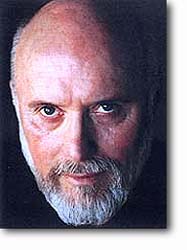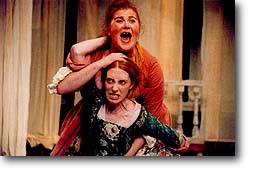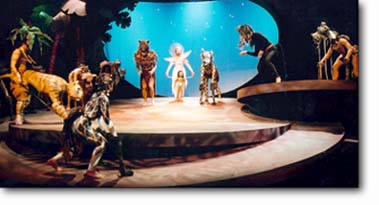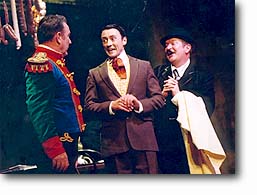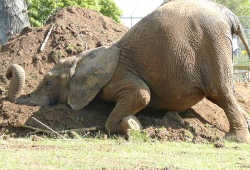Dorothy – 01/02/01
|
|
| Elric Hooper Photo source Elric Hooper |
Directing four major productions, two in Auckland and two in Wellington, teaching three theatre courses, researching and presenting five major broadcasts on musical subjects on the Concert Programme, and in December being awarded the degree of D.Litt. honoris causa by the University of Canterbury – all this has been fitted into the first year of Elric Hooper’s ‘retirement’ after he resigned from his position as director of the Court Theatre in 2000. What was to be a year of retirement Elric describes as “a year of total occupation”.
Auckland production of Goldoni’s The Coffee Shop at Unitec Unitec Elric describes as “probably the best theatre school in New Zealand because it has such a wide range of teaching”. Here Elric directed a play that no commercial management would touch because of its cast size. Two short plays, The Coffee Shop and The Little Square written by Goldoni, the eighteenth century Italian playwright, were combined. They could be put in the same setting and as the scenes about different families are all fragmented it was possible to interlard them as in television programmes like Coronation Street’. In fact Elric described Goldoni’s work as “eighteenth century Coronation Street.
|
|
| Two middle aged women enjoy a cat fight. Photo source Elric Hooper |
Elric was delighted with the choice of plays. "The result of using the two plays was that all the nineteen students had really good parts, particularly the women. One of the great problems in finding work for drama schools is finding plays which have large casts and good parts for all the students, but particularly for the women. The great advantage about Goldoni is that here is a classical playwright who writes lots of parts for women. The leading comedians in his company were the females, although the proportion in his plays is still two thirds men and one third women. He writes such stunning roles for females that it was really stimulating for the women who played them. There are lots of fights in the play including a great cat fight between two middle aged women."
The students taking part were in the final year of their training. Elric taught a course on basic principles of performing classical theatre, particularly eighteenth century plays, and found the students stunning and excellently prepared. He also found that they had a degree of vocal prowess he had not found elsewhere in New Zealand – free voices, very good ears. They did a lot of work in Italian, including three Italian songs which were included in the production, and the plays were performed with an Italian accent.
Elric thoroughly enjoyed directing the production. "I would happily have presented The Coffee Shop as a professional production and had no fear of doing so. The school backed me up completely and the costumes and settings were beautiful. The costumes were freshly made by Murray Hutchinson, the head of acting at the school. He is multi-talented, skilled at teaching acting and designing sets and costumes. Unitec allowed me to bring to Auckland Sheena Baines, my former lighting director in Christchurch, to light the production."
The Coffee Shop ran to full houses for two weeks.
Revival of The Jungle Book in Wellington Elric’s next production was Kipling’s The Jungle Book, with the same costumes as for the production at the Court Theatre in Christchurch. Allan Lees who had designed the costumes for the Court Theatre production came from Australia to design a new and very different set as well for this production. It was very successful at the box office and the production won the Chapman Tripp Award at the end of year for the best costumes.
|
|
| The animals in The Jungle Book Photo source Elric Hooper |
Radio Broadcasts Next Elric spent a month preparing talks on musical topics for the Concert Programme. He is attracted to rather abstruse subjects and three stand out among this year’s topics.
Wittgenstein – the left-handed pianist Paul Wittgenstein made his debut as a pianist in 1913, but lost his right hand early in World War I. As he belonged to an immensely wealthy family he commissioned left-handed concerti and other piano works from the famous composers of his day – such as Korngold, Prokofiev, Benjamin Britten, Maurice Ravel and Richard Strauss. With no respect for the composer he altered pieces as he wished and if he did not like a composition he put it away and allowed no one else to play it. Having commissioned the works he regarded them as his personal property. For instance the Fourth Piano Concerto by Profokiev which was written in 1932 was never played until 1956.
New Zealand pianist, Michael Houston, has been having pain in his right hand and has been exploring works for the left hand and was therefore able to provide valuable information for this research. Normally the right hand plays about a hundred notes to one by the left, and the musculature of the right hand side is much more heavily developed than that of the left.
Verdi and Shakespeare Elric presented a programme about the curious relationship between Verdi and Shakespeare as a background to the performance of Falstaff. Verdi is not just an enthusiast for Shakespeare’s plays, but there are many psychological parallels. For instance some of the most moving family relationships in Shakespeare are between father and daughter, and Verdi seems to seek these out too.
Verdi only saw about five performances of Shakespeare’s plays in his life, and he originally read them in an edition heavily influenced by Schlegel, the great German critic, who was the first person to point out that Shakespeare’s merits lay in his organic structure built according to the subject matter, not subjected to the classical canon. In Verdi’s last operas the organic structure is predominant.
Albéric Magnard This French composer is possibly most famous for his death which occurred in 1914 when he was standing on the upper balcony of his house and fired on the invading Germans in a one-man defence of France and they shot him. Elric did a programme on Magnard’s ‘amazing opera’ called Guercoeur. This curious opera is part of the French response to Wagner – operas with a mythical theme. The plot is strange, but the music wonderful, in Elric’s view. It was performed only once, in 1936. Magnard also wrote four symphonies which have been recorded by the New Zealand Symphony Orchestra. There is little written about him in English, but a book about him was published in Paris in May in 2001.
Back to Auckland to direct Michael Frayn’s Copenhagen This was a great success and was named by the Herald as the best production of a stage play in Auckland in 2001. "I had a dream cast," Elric said, ” Ilona Rogers, Stuart Devenie and David Aston". The Prime Minister, Helen Clark, gave it a great boost by giving it high praise during a television interview.
Back to Wellington to Downstage with Tom Stoppard’s On the Razzle
|
|
| On the Razzle – a hilarious moment fitting a new uniform Photo source Elric Hooper |
Elric had produced this play twice before, but because he had a different cast and a different theatre and because Stoppard has revised the text with some passages cut and some new jokes put in the production had to be wholly reconceived. It won the Chapman Tripp prize for the best production of a stage play in Wellington in 2001.
Culmination of a successful year and an outstanding career – honorary doctorate. On December 12 Elric Hooper was awarded the honorary degree of Doctor of Letters, D Litt, honoris causa.
What does Elric miss when not home-based for the year? He misses Christchurch, which is a city he loves. He misses immediate access to his widely based library. He misses being able to look through his art books as he listens to music, and he misses tending his balcony gardens – which he thinks may be the most tended few square metres of plants in the world.
Writing theatre memoirs All Elric has been free to do in preparation for writing his memoirs is to establish a chronology of his activities and read many other theatre biographies in order to get an overview of what’s good and what’s bad.
"I have found most of them appalling," he said, "mainly because one of the problems of writing about the theatre is the episodic nature of the occupation – one play or show after another. It is like being faced with a whole lot of beads, and you have to try to make some sense out of them by stringing them together. Herein lies one of the great dangers of the theatrical life. In order to make sense of it the myth building that goes with it is often aimed at making some sense of the very disparate nature of the theatrical profession. Where does myth making end and lying begin?
"Also the memory is such a deceptive instrument in that one thing I have discovered in trying to form a chronology is that you often attribute an action to a particular cause only to find in research that ‘the cause’ happened six months after ‘the event’. One of the most surprising things is the truth."

